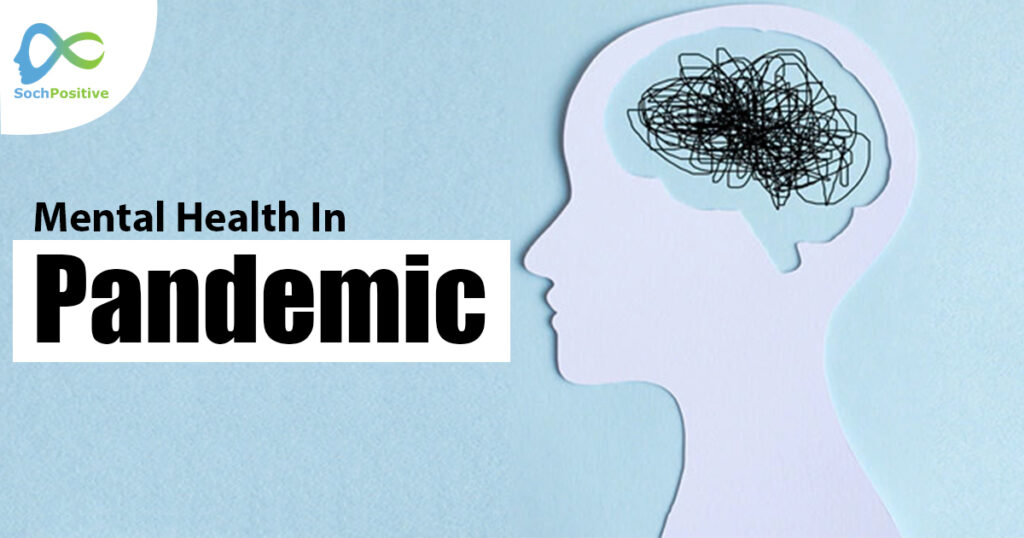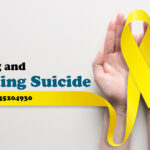By Krish Virmani
An individual’s mental health is the aggregate of their physical, psychological, and
socioemotional fitness. It not only functions as an indicator of health but serves as a critical
determinant of overall well-being, making it an essential quality of a fulfilled life. However, the
last two years have borne witness to an abrupt decline in the mental health of individuals all over
the globe resulting from the rapid spread and the subsequent consequences of Covid-19 [severe
acute respiratory syndrome coronavirus 2 (SARS-CoV-2)].
Effects of Covid-19 on Mental Health
The ongoing crisis combined with pandemic-induced isolation, unemployment, and
financial desolation has paved the way for a mental health crisis that most countries were not
prepared for, let alone a third-world country like India, where mental health remains to be a
neglected topic. Even before the pandemic, India was rated as having the highest mortality rates
due to suicide as well as having an overwhelming 20 Lakh individuals diagnosed with mental
health disorders (as cited by Krishnan, 2021).
The dire situation was only made worse due to innumerable psychological and social
challenges that the pandemic brought along with it as indicated by a report from the BMC
helpline in Maharasthra, where almost 4 lakh individuals complained of anxiety, isolation,
substance use, and depression in the first two months of the lockdown itself while many others
suffered from sleep irregularities and the worsening of existing mental health conditions (as cited
by Mona, 2021). The feelings of fear and anxiety associated with the disease were only
exacerbated due to poor health infrastructures, mismanagement of resources, and the severe lack
of medical personnel. While cases of mental disorders and associated problems skyrocket, it is
becoming clear that the Mental health Provisions in place are somewhat inadequate in addressing
the needs of the general public. Therefore, it has become even more important to understand the
repercussions, and various methods to cope with the pandemic, on a more personal level.
At-risk Populations
While this all-pervasive phenomenon has affected almost everybody in the world, the
nature of the effect varies for different parts of the population, where it may even affect certain
sections worse than others. It is important to recognize whether you or individuals close to you
lie in such at-risk sections so that one can be better prepared to address and foster their mental
health care needs.
A large proportion of the Indian population such as senior citizens, individuals suffering
from chronic or acute ailments, migrant laborers, quarantined individuals, and even families of
those who are suffering or quarantined are considered at risk and bear most of the brunt along
with the frontline healthcare workers of the country. Such individuals often require
comparatively severe interventions in the form of state policies and relief measures to deal with
the immediate threats to their well-being.
Pandemic-related consequences such as the closure of universities and loss of incomes
have also led to an increase in anxiety and/or depressive thoughts in young adults. Further,
research indicates that this section of the population is much more likely to engage in suicidal
ideation and substance use compared to members of other sections of the population (Panchal et.
al, 2021).
The effects of the pandemic have also differed in terms of gender with a disproportionate
number of women reporting increased psychological distress when compared to men. One reason
for this disparity is that women are expected to perform most household chores and attend to the
family’s health and food needs leading to a dual role consisting of their household and workrelated duties.
In terms of employment, women have also been the victim of an increasing number of
job cuts due to economic recession when compared to men leading to higher levels of stress.
Lastly, there has been an abrupt increase in intimate partner violence in dyadic relationships
during the lockdown. All of these reasons, combined with the existing prevalence of mental
ailments in women indicate have made them especially at-risk of the psychological consequences
of Covid-19 (Panchal et. al, 2021; Roy, 2021).
Fostering your mental health during the pandemic
Even though the effects of the covid-19 pandemic have varied across the population, various
general techniques and strategies can help individuals deal with the stressors and better cope with
the changes brought on by the pandemic.
• Organization and Time management: One of the most crucial steps in dealing with the
uncertainty caused by the pandemic is to introduce order into your daily life. Planning out
your tasks and activities in advance will not only help you better adjust to the lifestyle
changes, but this structure will also provide you with a sense of security and help you
gain your bearings in such anxiety-provoking times.
• Taking care of your health: Mental and physical well-being are very closely related;
thus, it is important to maintain a healthy lifestyle-including proper diet, sleep, exercise,
and social contact (at home or online) to nurture a healthy mind. One should also refrain
from all unhealthy coping mechanisms such as alcohol, smoking, or other addictive
substances to deal with their emotions as they can have severe negative impacts on their
health and social life.
• Behavioral Activation: Research indicates that individuals can change the way they feel
just by changing what they are doing. This idea of improving your mood by engaging in
activities that give you a sense of accomplishment, enjoyment, and control is fundamental
in allowing individuals to cope with the stressors, even without the help of medical health
professionals.
• Mindfulness: Even in the face of profound disruptions to daily life and routines,
individuals can reorient themselves and become more aware of their situations through
practicing mindfulness. This functions as an unbinding agent from the sense of dread
about future events (McPherson, 2021). One can become more mindful by taking few
minutes every day to focus on their breathing, sensations, and any anxious or upsetting
thoughts.
• Healthy Social Media Intake: While limiting exposure to anxiety-provoking media is a
valid preventive measure, it is also important to be aware of your social media usage and
whether it benefits you or not. Therefore, be careful of your time so as to avoid countless
hours wasted scrolling mindlessly across the internet. Further, one should always verify
the sources of the information they share to avoid any spread of false information.
It is normal to feel sad, stressed, scared, or even angry during such tumultuous times. However,
if you are having difficulty coping with such emotions it is important to reach out for help from
your friends and family.






